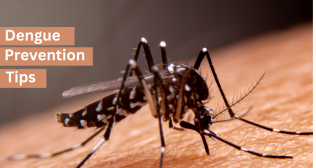
Unmasking Typhoid Fever: The Hidden Realities of a Deadly Disease
Introduction
Typhoid fever, or enteric fever, is a bacterial infection caused by Salmonella typhi and usually spreads through contaminated food and water. Once the bacteria enter the body, primarily affecting the gastrointestinal tract, they multiply and spread throughout the bloodstream, causing severe illness. Urbanization, climate change, and increasing resistance to antibiotic treatment are making it easier for typhoid to spread in places that lack access to safe drinking water or adequate sanitation.
Understanding how the bacteria spread is crucial for implementing preventive measures to reduce the risk of infection.
How Does Typhoid Spread?
The primary ways in which typhoid fever spreads are as follows:
- Fecal-Oral Route: The bacteria shed through the feces of infected individuals, and the feces contaminate the food and water due to poor hygiene.
- Contaminated Food and Water: Consumption of contaminated food or beverages, like raw fruits or undercooked vegetables, seafood, and dairy products and untreated water, introduces Salmonella typhi into the digestive system.
- Person-to-Person Transmission: Typhoid fever can spread from person to person through direct or indirect contact, such as sharing food, utensils, and drinks or through caregivers and health workers without proper infection control precautions.
- Carrier State: Chronic carriers harbor the bacteria in their gallbladder or intestines even after acute illness and shed the bacteria in their feces or urine, posing a risk of transmission.
- Contaminated Environment: Sewage water sources or improper disposal of human waste can contribute to the spread of typhoid fever.
- Travel-Related Transmission: Travelers visiting regions where typhoid fever is endemic are at risk of acquiring the infection through contaminated food, water, or environments.
Who is Most At Risk?
- People with weakened immune systems
- Young children with immature immune systems and older adults with health conditions
- Individuals working in healthcare settings, food-handling establishments, or sanitation facilities
- Unvaccinated people
Symptoms and Clinical Presentation
The clinical presentation of typhoid fever can vary from mild to severe, and you might not exhibit symptoms until 1–3 weeks after exposure to the bacteria.
Common symptoms include:
- High fever
- Headache
- Abdominal pain
- Weakness and fatigue
- Loss of appetite
- Rash
Laboratory Investigations That the Doctor May Prescribe
Diagnosing typhoid fever requires a combination of clinical evaluation and laboratory investigations. Standard diagnostic tests include blood cultures, which can identify the presence of Salmonella typhi in the bloodstream, and stool cultures, which may reveal the bacteria in fecal samples. Additionally, imaging studies, such as abdominal ultrasound or X-rays, assess complications such as intestinal perforation.
Treatment Strategies
Prompt initiation of treatment is essential to reduce the severity and duration of the illness and prevent complications. Here’s an overview of the treatment approaches adopted for typhoid fever:
- Antibiotics are effective in eliminating Salmonella typhi. The choice of antibiotic may depend on antimicrobial resistance patterns, severity of illness, age of the patient, and any underlying medical conditions or allergies.
- Adequate hydration with oral rehydration solutions (ORS) or intravenous fluids is essential in patients with fluid losses due to vomiting and diarrhea. Small, frequent meals or nutritional supplements are recommended to meet energy and nutrient requirements.
- Medications may be prescribed to alleviate specific symptoms.
- Close patient monitoring is essential to assess response to treatment and detect any complications. Management of complications includes surgical intervention, blood transfusion, or specific therapies for complications affecting other organs.
- Typhoid patients with a complicated condition might require hospitalization.
What are the Complications of Typhoid?
Typhoid fever, if left untreated or inadequately managed, can lead to various complications, some of which can be severe and life-threatening.
- Intestinal Perforation: Ulcers are formed in the intestines due to leakage of intestinal contents into the abdominal cavity, causing inflammation of the abdominal lining.
- Gastrointestinal Bleeding: Severe inflammation and ulceration of the intestinal mucosa leads to gastrointestinal bleeding, manifesting as bloody stools or blood vomiting.
- Septicemia: Typhoid fever can progress to septicemia, where bacteria spread throughout the bloodstream, causing low blood pressure, multiple organ dysfunction, and poor tissue perfusion.
- Hepatic Complications: Typhoid fever can cause hepatitis (liver inflammation), cholecystitis (gallbladder inflammation), and hepatic abscess formation.
- Neurological Manifestations: Typhoid fever can affect the central nervous system, leading to meningitis (inflammation of the meninges), encephalitis (inflammation of the brain), or focal neurological deficits.
- Renal Complications: Typhoid fever can also affect the kidneys, leading to acute kidney injury (AKI), interstitial nephritis, or nephrotic syndrome.
- Respiratory Complications: Although less common, typhoid fever can lead to respiratory complications such as pneumonia or pleural effusion (fluid accumulation in the pleural cavity).
- Cardiac Complications: Typhoid fever can affect the heart, leading to cardiac complications such as myocarditis (inflammation of the heart muscle), pericarditis (inflammation of the pericardium), or arrhythmias.
How Can Typhoid Be Prevented?
Preventing typhoid fever requires a multi-faceted approach that addresses individual- and community-level interventions. Key preventive measures include:
- Vaccination: Typhoid vaccines are recommended for individuals living in or traveling to endemic areas and high-risk populations to reduce disease burden.
- Improving Sanitation and Hygiene: Promoting access to clean water, proper sewage disposal, and hygiene practices, like washing hands, washing fruits and vegetables, consuming hot foods, and drinking only pasteurized or boiled milk, can help prevent the transmission of Salmonella typhi.
- Food and Water Safety: Implementing food safety measures, such as thorough cooking and proper storage of food, and ensuring the safety of drinking water through treatment and purification methods are essential for preventing contamination.
Typhoid fever remains a formidable public health challenge with significant morbidity and mortality worldwide. Understanding the causes, symptoms, diagnosis, treatment options, and preventive measures is essential for mitigating the impact of this disease. By adopting a comprehensive approach that combines vaccination, improved sanitation and hygiene practices, and targeted interventions, the burden of typhoid fever can be reduced, and the health of populations globally can be safeguarded.
Popular Searches :
Hospitals: Cancer Hospital in Delhi | Best Heart Hospital in Delhi | Hospital in Amritsar | Hospital in Ludhiana | Hospitals in Mohali | Hospital in Faridabad | Hospitals in Gurgaon | Best Hospital in Jaipur | Hospitals in Greater Noida | Hospitals in Noida | Best Kidney Hospital in Kolkata | Best Hospital in Kolkata | Hospitals in Rajajinagar Bangalore | Hospitals in Richmond Road Bangalore | Hospitals in Nagarbhavi Bangalore | Hospital in Kalyan West | Hospitals in Mulund | Best Hospital in India | Gastroenterologist in Jaipur | Cardiology Hospital in India
Doctors: Dr. Rana Patir | Dr. Rajesh Benny | Dr. Rahul Bhargava | Dr. Jayant Arora | Dr. Anoop Misra | Dr. Manu Tiwari | Dr. Praveer Agarwal | Dr. Arup Ratan Dutta | Dr. Meenakshi Ahuja | Dr. Anoop Jhurani | Dr. Shivaji Basu | Dr. Subhash Jangid | Dr. Atul Mathur | Dr. Gurinder Bedi | Dr. Monika Wadhawan | Dr. Debasis Datta | Dr. Shrinivas Narayan | Dr. Praveen Gupta | Dr. Nitin Jha | Dr. Raghu Nagaraj | Dr. Ashok Seth | Dr. Sandeep Vaishya | Dr. Atul Mishra | Dr. Z S Meharwal | Dr. Ajay Bhalla | Dr. Atul Kumar Mittal | Dr. Arvind Kumar Khurana | Dr. Narayan Hulse | Dr. Samir Parikh | Dr. Amit Javed | Dr. Narayan Banerjee | Dr. Bimlesh Dhar Pandey | Dr. Arghya Chattopadhyay | Dr. G.R. Vijay Kumar | Dr Ashok Gupta | Dr. Gourdas Choudhuri | Dr. Sushrut Singh | Dr. N.C. Krishnamani | Dr. Atampreet Singh | Dr. Vivek Jawali | Dr. Sanjeev Gulati | Dr. Amite Pankaj Aggarwal | Dr. Ajay Kaul | Dr. Sunita Varma | Dr. Manoj Kumar Goel | Dr. R Muralidharan | Dr. Sushmita Roychowdhury | Dr. T.S. MAHANT | Dr. UDIPTA RAY | Dr. Aparna Jaswal | Dr. Ravul Jindal | Dr. Savyasachi Saxena | Dr. Ajay Kumar Kriplani | Dr. Nitesh Rohatgi | Dr. Anupam Jindal |
Specialities: Heart Lung Transplant | Orthopedic | Cardiology Interventional | Obstetrics & Gynaecology | Onco Radiation | Neurosurgery |



















